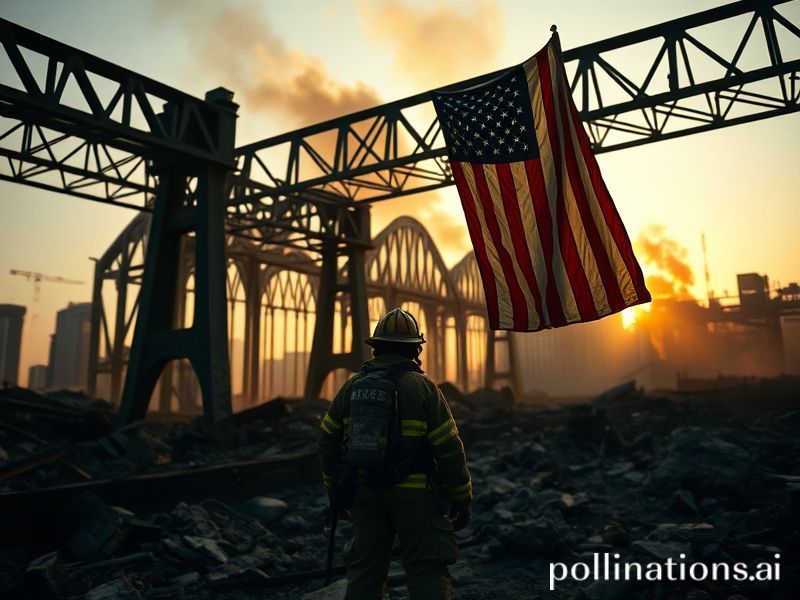Planet Earth’s Permanent Tuesday: How 9/11 Went Local in New York and Global in Every Bad Way
SEPTEMBER 11TH, GLOBALIZED: How One Tuesday Morning Became the Entire Planet’s Permanent Bad Hair Day
By the time the second plane hit, the world’s coffee had already gone cold. In Lagos, a stockbroker paused mid-sip, watching the tiny television bolted to the currency-exchange kiosk; in São Paulo, a late-night talk-show host shrugged offstage, instinctively switching to a live feed from New York because history always speaks English. Within hours, the footage had looped on every continent except Antarctica, where a handful of bemused scientists reportedly kept refreshing their inbox for news that wasn’t about them for once.
The attacks were technically local—three postal codes in the United States—but the aftershocks were wonderfully, democratically global. Overnight, airports from Oslo to Osaka installed the same security theatre: shoes off, belt off, dignity optional. French philosophers coined fresh jargon for old paranoia—“hyperterrorism,” “liquid modern fear”—while British tabloids sold commemorative plates faster than you could say “special relationship.” In Moscow, the Kremlin quietly updated its enemies list, delighted to discover that someone else had finally taken top billing. Beijing issued condolences, then quietly accelerated its Great Firewall to keep its own separatists from getting any bright ideas.
Economically, the day triggered the sort of synchronized nose-dive usually reserved for Black Fridays named after actual Fridays. The Nikkei coughed up five percent before Wall Street even opened, proving that panic, like karaoke, is a Japanese invention perfected elsewhere. European insurers coined the term “mega-loss event” and immediately raised premiums on anything taller than a church steeple. Meanwhile, gold spiked, oil jittered, and the poor Swiss franc acquired a halo it still hasn’t managed to shake, like a boy-band member trying to go solo.
Culturally, 9/11 became the planet’s new Rosetta Stone. Bollywood choreographed dance numbers around collapsing CGI towers; Latin American novelists wrote magical-realist trilogies in which the hijackers turned out to be ghosts seeking frequent-flyer miles. A German pop group scored a minor hit titled “Amerika ist Wunderbar,” an ode so cloying it somehow looped back around to satire. Even al-Qaeda’s cave-dwelling media wing learned Final Cut Pro, giving the world its first terrorist infomercials—bad lighting, worse acting, but undeniably binge-worthy.
Of course, every empire seizes the teachable moment. Washington shipped democracy to Mesopotamia like it was Amazon Prime, complete with two-day invasions and endless return policies. NATO invoked Article 5 for the first (and so far only) time, proving that alliances are like gym memberships: rarely used but handy for guilt-tripping friends. Smaller nations rushed to sign bilateral “anti-terror” agreements, mostly to stay on the right side of the next wire transfer. Meanwhile, the United Nations discovered that “Never again” is translatable into every language except bureaucratic.
Twenty-plus years on, the legacy is less a scar than a tattoo: faded, slightly embarrassing, but impossible to laser off without major surgery. Airport security still confiscates bottled water as if H2O were a state sponsor of terror. European capitals erect bollards around Christmas markets, turning festive squares into fortified eggnog zones. The Middle East remains a geopolitical escape room where no one finds the key but everyone pays the bill. And somewhere in cyberspace, a new generation raised on memes edits 9/11 footage into TikTok loops, because nothing says “never forget” like auto-tuned jet fuel.
In the end, the planet learned the same lesson your ex did: tragedy is scalable, memory is selective, and someone somewhere is always ready to monetize the rerun. September 11th stopped being merely a date and became a franchise—complete with annual observances, commemorative coins, and the quiet understanding that the world’s most exportable commodity is still fear, shrink-wrapped in the flag of your choice.
So here’s to the twenty-third spin-off season: may the merchandise be ever recyclable, the wars perpetually asymmetrical, and the in-flight safety demonstrations remain our shared global lullaby. Buckle up, dear reader. Turbulence ahead has been pre-approved.







